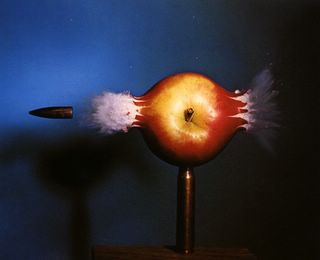“Faster than a speeding bullet.” This was the infamous description for the notable superhero Superman. Leap tall buildings in a single bound, faster than a speeding bullet, more powerful than a locomotive, were all said to be traits of this awesome being. But how fast does a speeding bullet travel? Speeds fluctuate and depend upon several factors. Gravity makes a projectile fall toward the earth while in flight. The projectile's size, shape, and the air density affect the speed by which it travels. Air resistance slows the speed of a bullet and reduces the distance by which it travels. The World Book Encyclopedia tells us that "with modern propulsion techniques, the projectile's initial velocity may be as high as 4000 feet (1200 meters) per second for some rifles and 5000 feet (1500 meters) per second for some large guns."[i] As impressive as this might seem, it doesn’t exactly hold water to the speed of light or Light Himself.
Light travels at approximately 186,282 miles per second. Nothing in our experience can move faster. It is the universal, absolute standard of speed. Einstein, in fact, postulated that everything - even time itself - is relative to only one existing constant: the speed of light.
Einstein said that the reason he could construct the theory of relativity was because there is one thing in the world that is unchangeable. That one thing—the speed of light—is the only constant in this physical, material universe.
Ponder...
Light travels at approximately 186,282 miles per second. Nothing in our experience can move faster. It is the universal, absolute standard of speed. Einstein, in fact, postulated that everything - even time itself - is relative to only one existing constant: the speed of light.
Einstein said that the reason he could construct the theory of relativity was because there is one thing in the world that is unchangeable. That one thing—the speed of light—is the only constant in this physical, material universe.
Ponder...
Grab a Bible and look up the following references. Ponder what they’re saying about the Jesus Christ.
Jesus Christ is the absolute standard by which all other things are measured (Acts 17:31). He never changes His character (Heb. 13:8). It is easier for heaven and earth to pass away than for anything that comes from His mouth to be annulled, changed, or altered (Matt. 5:18, 24:35) - and even time itself is subject to Jesus Christ, He was alive before there was time (John 1:1), and He will be alive when the new heavens and new earth are made (Rev. 21:6).
Jesus Christ is the absolute standard by which all other things are measured (Acts 17:31). He never changes His character (Heb. 13:8). It is easier for heaven and earth to pass away than for anything that comes from His mouth to be annulled, changed, or altered (Matt. 5:18, 24:35) - and even time itself is subject to Jesus Christ, He was alive before there was time (John 1:1), and He will be alive when the new heavens and new earth are made (Rev. 21:6).
When Jesus wants something done,
nothing can slow Him down;
nothing can hinder Him from the execution of His plan
(Matt. 28:18).
“Science conducts us, step by step,
through the whole range of creation,
until we arrive, at length, at God.”
MARGUERITE DE VALOIS Memoirs
nothing can slow Him down;
nothing can hinder Him from the execution of His plan
(Matt. 28:18).
“Science conducts us, step by step,
through the whole range of creation,
until we arrive, at length, at God.”
MARGUERITE DE VALOIS Memoirs
[i] Ballistics. The World Book Encyclopedia. New York: World Book, 1998.


No comments:
Post a Comment